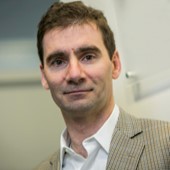
Matthew Delisa, William L. Lewis Professor of Engineering in the School of Chemical and Biomolecular Engineering at Cornell University and Director of the Cornell Institute of Biotechnology
"Shedding light on the dark proteome: the next frontier in drug discovery and development"
Abstract:
Abstract. Post-translational modifications (PTMs) are crucial chemical alterations that occur on proteins after their synthesis, significantly influencing their function, localization, stability, and interactions. These modifications can include acetylation, glycosylation, methylation, phosphorylation, and ubiquitination, among others, each imparting unique properties to the protein and collectively serving to expand the functional diversity of the proteome. Indeed, understanding proteome complexity in the context of PTMs is essential for insights into cellular functions and disease mechanisms. However, post-translationally modified proteins represent a major constituent of the ‘dark proteome’, which is the portion of the proteome that remains largely uncharacterized in terms of functions, structures, and interactions. This hidden aspect of cellular biology poses significant challenges due to the lack of suitable biosynthesis technologies and analytical methods for making and detecting dark proteome proteins and the lack of molecular tools for precisely editing or modifying specific dark proteome proteins in their native environment. Therefore, to help shed light on these invisible yet highly important members of the proteome, we are developing an expanded synthetic biology toolkit that enables: (1) controllable bacterial cell-based and cell-free production of the complete ensemble of distinct human protein molecules, known as proteoforms, with molecular accuracy and at scale; and (2) precise writing and erasing of PTMs directly in human cells and in mice with the speed, ease-of-use, and reliability of analogous genome editing tools such as CRISPR-Cas. This talk will discuss our efforts to illuminate the dark proteome, which seek to deepen our understanding of PTM-driven proteome complexity and unlock the functional and therapeutic potential of these elusive proteins.
Bio:
Matthew P. DeLisa is the William L. Lewis Professor of Engineering in the School of Chemical and Biomolecular Engineering at Cornell University and Director of the Cornell Institute of Biotechnology. He received his PhD in Chemical Engineering at the University of Maryland and was a postdoctoral fellow in the Department of Chemical Engineering at the University of Texas-Austin. His research focuses on understanding and controlling the molecular mechanisms underlying protein biogenesis -- folding and assembly, membrane translocation and post-translational modifications -- in the complex environment of living cells. His contributions to science and engineering include the invention of numerous commercially important technologies for facilitating the discovery, design and manufacturing of human therapeutics and vaccines as well as seminal discoveries in the areas of cell-based and cell-free protein folding and post-translational modification. He is an elected fellow of the American Association for the Advancement of Science (AAAS), the American Institute for Medical and Biological Engineering (AIMBE), and the American Academy of Microbiology (AAM), and a recipient of many honorific distinctions and prestigious awards including the Marvin J. Johnson Award from the American Chemical Society BIOT Division, the Charles Thom Award from the Society for Industrial Microbiology and Biotechnology, an NSF CAREER Award, and Young Investigator Awards from the ACS BIOT Division, Beckman Foundation, Biochemical Engineering Journal, and Office of Naval Research (ONR). He has served on the IDA/DARPA Defense Science Study Group (DSSG) and the National Academies Committee on Innovative Technologies to Advance Pharmaceutical Manufacturing. He has published over 150 papers, which have been cited more than 14,000 times, and he serves/served on the editorial boards of 14 journals including as Chief Editor of the Glycobiology Section in Frontiers in Molecular Biosciences. He holds over 80 issued and pending patents worldwide, many of which have been licensed to biotech companies, and he is co-founder of 6 companies including SwiftScale Biologics which was acquired by National Resilience.